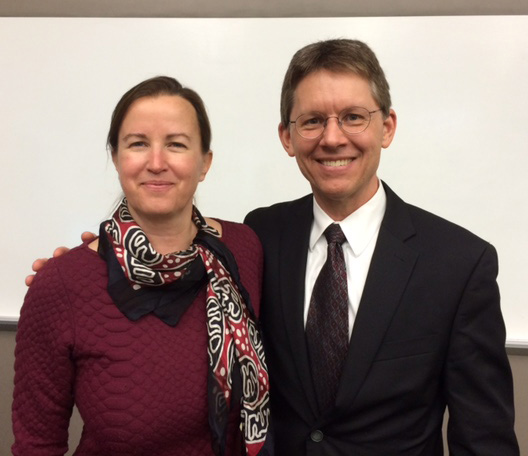Black researchers matter: Why STEM fields need more minority representation
During a presentation at Mount Mary University, Dr. Mike Summers offered anecdotal and statistical evidence on the need for minority representation within medical research.
When Mike Summers of the University of Maryland, Baltimore County, meets with high schoolers who want to enter his university's specialty program for minority students, he finds that many of them aspire to become doctors.
He offers them some statistics in hopes of changing their minds.
Black men and women have 30 percent higher rates of coronary heart disease, higher risk of diabetes and lupus for women and a life expectancy for men six 6 years shorter than it is for white counterparts.
Those disparities aren't just numbers, he tells them. They are mothers, fathers, family and community. And they need researchers who care about them as such, with a strong desire to make medical advances.
"Working in the field of research lets students create new technology, instead of working (as doctors) within existing technology."
During a presentation Friday at Mount Mary University, Summers offered anecdotal and statistical evidence on both the need for minority representation within medical research, and on the success of his University's Meyerhoff Scholars Program, designed to foster and create the research community of tomorrow.
"We want to produce more black Ph.D.s and doctor-researchers." -Dr. Mike Summers on the objective of the Meyerhoff Scholars Program of the University of Maryland, Baltimore County, which cultivates an average of 15 Ph.D.s a year
The Meyerhoff Scholars Program began in 1988 and is open to high-achieving students of all backgrounds committed to increasing the representation of minorities in science and engineering. According to the program's website, the program's success is built on the premise that, "among like-minded students who work closely together, positive energy is contagious. By assembling such a high concentration of high-achieving students in a tightly knit learning community, students continually inspire one another to do more and better." The program has been recognized by the National Science Foundation and The New York Times as a national model.
Summers spent the day talking about the scholar program and his research. He also observed firsthand Mount Mary's programming efforts to attract and retain minority students. Mount Mary has the fifth highest rate of multicultural representation in the Midwest, according to a study by US News and World Report.

Here are some of his comments:
On retention rates among minority students: According to his statistics, black students comprise 12 percent of all college students in the U.S. They comprise 8.7 percent of all the bachelor's degrees earned. From there, only 2.6 percent of all science and engineering Ph.D.s are awarded to black scholars. He called this "the leaky pipeline."
On the importance of high expectations: As they rise through the ranks of academia, black students say they encounter overt and unintended messages that imply, "I don't expect you to be here," he said. "From the earliest age, these students hear a pervasive negative drumbeat," Summers said. The Meyerhoff Scholars Program involves raising the bar on expectations; building in greater accountability for high performance and creating clear pathways for students to witness the success of others.
On fostering a group mentality: Students must participate in a summer bridge program before their first semester that he characterizes as "brutal." Students form study groups to work together. And while they take tests individually, each member of the group receives the grade of the lowest member of the group. Also, the entire class receives the grade of the lowest group, making it extremely motivating for the group to help all its members succeed. He calls this "building a cohort mentality."
Why so tough? The only way to be taken seriously in academia is to start strong from the very first semester, in order to start building credibility and relationships. "Faculty embrace academically strong students who are excited about research," he said. He hopes that academic success will lead to a desire to foster that goal in others, too. "Our hope is that students don't just take jobs in industry, that they take academic positions and become catalyst for change."
On his HIV research: There have been 29 million AIDS deaths since 1981, and 39.5 million people currently living have the HIV infection. The good news is that there are successful treatment options for the HIV virus and most patients can live a full lifespan. The bad news is that the drugs are expensive, compliance is difficult, and over time there is a potential for resistance. This is why there is an ongoing need to understand how HIV replicates, and for researchers from varied backgrounds who can empathize with the challenges to be involved.
Dr. Mike Summers directs a HHMI Education grant program at UMBC that supports high-achieving minority undergraduates, and an NIH IMSD-supported program. He has been the recipient of numerous mentorship awards, including the Ruth Kirstein Award of the American Society for Biochemistry and Molecular Biology (2014), the Carl Brӓndén Award of the Protein Society (2011), the American Association for the Advancement of Science (AAAS) Mentor Award (2003), the Emily M. Gray Award for Biophysical Society (2003), and the White House Presidential Award for Science Mentoring (2000).
For more information on the Meyerhoff Scholars Program and their efforts to build variety within the next generation of medical researchers, visit the following links:
- 60 minutes profile of the program
- TED Talk: The Four Pillars of College Success TED Talk by Freeman Hrabowski, president of the University of Maryland, Baltimore County